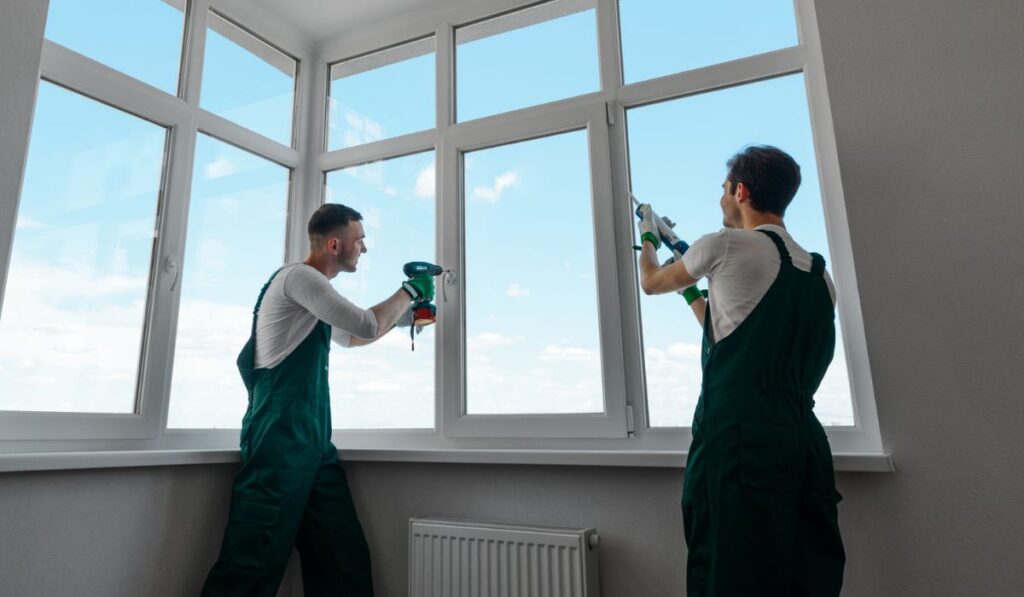Resealing windows is a key part of taking care of a home. Windows that aren’t resealed will often blow drafts into the house, reduce energy efficiency, and let water damage the house. This can usually be done as a DIY project, but sometimes—like if you have double-pane windows—you may need to hire a professional to do the job for you.
For most people, resealing windows once every 1-2 years is a good idea. The exact timing will depend on how often the window is used (opened and closed) as well as the weather and moisture it’s exposed to. If you notice damage or gaps, you should reseal your windows more often.
Let’s take a closer look at how often you should reseal your windows, including signs it isn’t being done often enough, how much it costs, and the many benefits of doing it.
How Often Should You Reseal Your Windows?

In general, you should reseal your windows every 1-2 years. However, if you notice any cracking or damage to the sealing, you should reseal your windows as soon as possible. How often you need to reseal your windows depends on how much use they get and how exposed to the weather they are, as well as the type of sealant that was used during the original installation.
Signs You Need to Reseal Your Windows
There are a few signs you need to reseal your window, including:
- Drafts coming in from around the window
- Water damage around the windows, such as seeing stains or mold
- Visible gaps in the window
- Difficulty opening and closing them
- High energy bills
- The sealant simply being old
How Much Does It Cost to Reseal a Window?
The cost of resealing a window can vary depending on several factors, such as the size and type of window, the extent of the damage or wear, and the type of sealant used. In general, if you choose to reseal a window by yourself, you should expect to pay around $50 per window.
If you choose to pay a professional to reseal your window, then you can expect to pay up to $200 depending on the size of your window and the damage that needs to be repaired. Single-pane windows can be resealed easily as a DIY job but, if you have double-pane windows or aren’t confident in the process, it’s a good idea to pay for professional labor.
What Are the Benefits of Resealing a Window?
There are several noticeable benefits to resealing a window.
Improved Energy Efficiency
A properly sealed window can help prevent air leaks, which can improve your home’s energy efficiency and lower your energy bills.
Reduced Noise
Resealing your windows can also help reduce outside noise, making your home quieter and more comfortable.
Protection Against Water
A tight seal around your windows can help prevent moisture from entering your home, which can help prevent water damage, mold, and other issues.
Better Air Quality
A tight seal around your windows can also help prevent outdoor pollutants, such as pollen and dust, from entering your home and improve indoor air quality.
Increased Comfort
By reducing air leaks and preventing drafts, resealing your windows can help make your home more comfortable year-round.
Longer Window Lifespan
Properly sealed windows can help prevent damage and wear to the windows themselves, extending their lifespan and saving you money on repairs and replacement.
Can You Reseal a Double-Pane Window?
It’s possible to reseal a double-pane window, but it’s a more complicated process than resealing a single-pane window. Double-pane windows are designed to be airtight to provide better insulation, so it’s important to maintain their seal to keep them functioning properly.
To reseal a double-pane window, you should remove the old sealant and replace it with new sealant. This can be difficult and time-consuming, and it’s important to take care not to damage the window itself during the process—which is easily done if you rush the process.
Some double-pane windows are designed with removable stops that allow you to remove the inner pane of glass and access the sealant. If your window has removable stops, it may be easier to reseal the window yourself.
However, if your double-pane window doesn’t have removable stops or if you’re not comfortable with DIY projects, it’s best to hire a professional to reseal your windows. A professional can ensure that the sealant is applied correctly and that the window is not damaged during the process.
Resealing vs Replacement: How to Choose

If you’re not sure whether to reseal or replace your window, you should consider a few things. The main thing to look at is the damage around the window.
If there are only small gaps, the window isn’t very old, and there doesn’t seem to be a lot of damage, then you should be able to reseal the window without replacing it. Resealing is also more budget-friendly, so if cost is an issue, you should err on the side of resealing.
However, if the windows are old and the damage is quite extensive then you should replace them. This may include large gaps in the window, poor energy efficiency, a clear draft coming in, or if the window is simply old and it feels about time to do that.
If you’re in any doubt about whether you should repair or replace your window, then it might be an idea to ask a professional. They will be able to inspect it and tell you what your best bet is, as well as provide cost estimates.
Overall, resealing your windows once every year or two should provide a good base for keeping them in great condition. However, if you notice that your windows are exposed to more weather or become noticeably damaged more frequently, you may have to increase this.
